Ethical and Legal Considerations of AI Data Usage Report
VerifiedAdded on 2023/01/23
|11
|2255
|92
Report
AI Summary
This report examines the ethical and legal aspects of artificial intelligence (AI) data usage. It defines AI, highlighting its applications and importance across various industries. The report explores ethical considerations, including machine ethics, features of AI that may cause ethical problems, ethical risks stemming from human factors like bias, and methods for educating AI to be ethical. It also discusses the legal frameworks surrounding AI, referencing relevant acts and government initiatives in the UK. The report analyzes the importance of data privacy, data protection assessments, and privacy by design. The report provides recommendations to the UK government regarding transparency, regulation, promotion, and implementation of AI data practices. The report concludes that AI should be used ethically and legally and that the UK government should prioritize AI systems to improve the country.
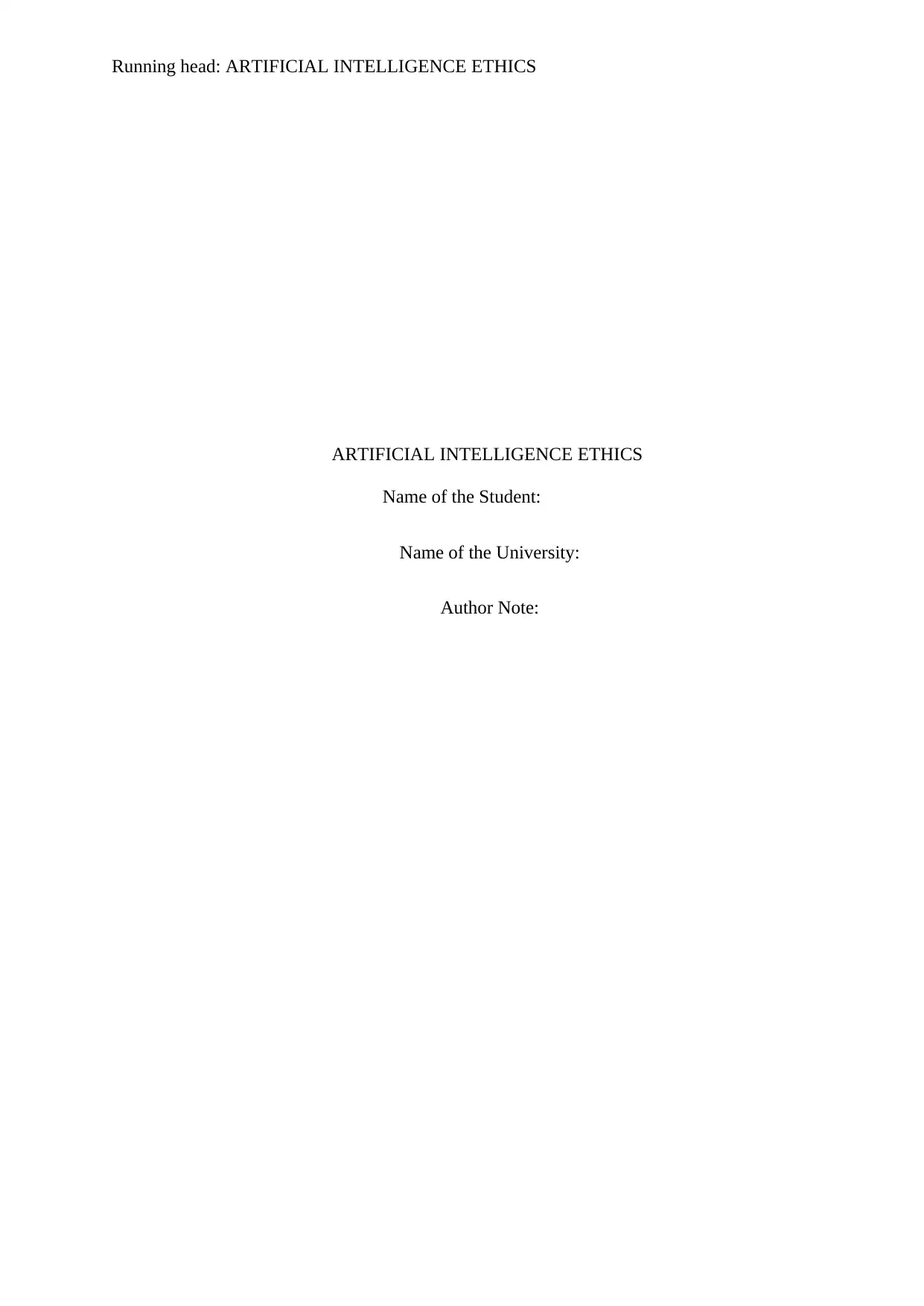
Running head: ARTIFICIAL INTELLIGENCE ETHICS
ARTIFICIAL INTELLIGENCE ETHICS
Name of the Student:
Name of the University:
Author Note:
ARTIFICIAL INTELLIGENCE ETHICS
Name of the Student:
Name of the University:
Author Note:
Paraphrase This Document
Need a fresh take? Get an instant paraphrase of this document with our AI Paraphraser
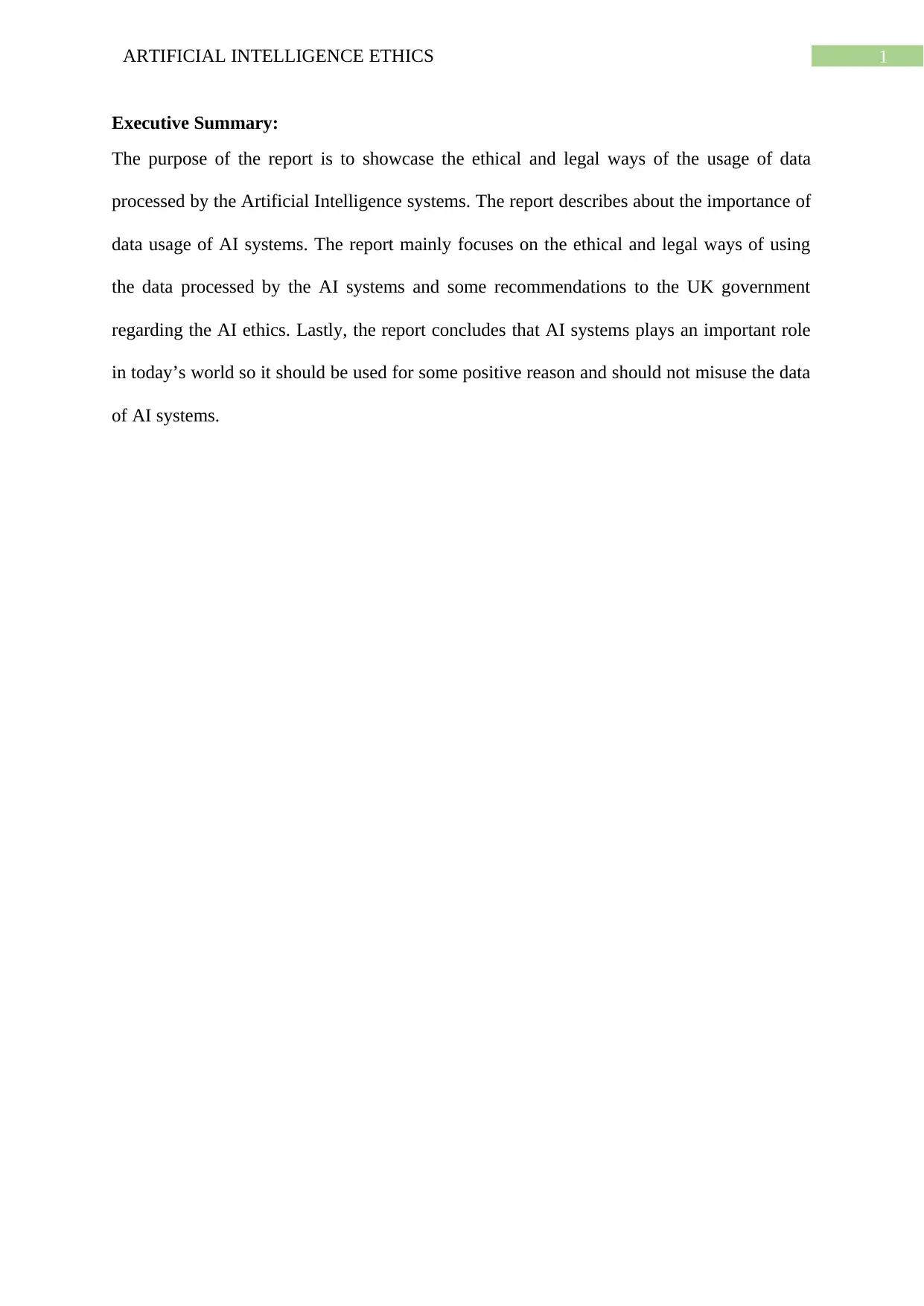
1ARTIFICIAL INTELLIGENCE ETHICS
Executive Summary:
The purpose of the report is to showcase the ethical and legal ways of the usage of data
processed by the Artificial Intelligence systems. The report describes about the importance of
data usage of AI systems. The report mainly focuses on the ethical and legal ways of using
the data processed by the AI systems and some recommendations to the UK government
regarding the AI ethics. Lastly, the report concludes that AI systems plays an important role
in today’s world so it should be used for some positive reason and should not misuse the data
of AI systems.
Executive Summary:
The purpose of the report is to showcase the ethical and legal ways of the usage of data
processed by the Artificial Intelligence systems. The report describes about the importance of
data usage of AI systems. The report mainly focuses on the ethical and legal ways of using
the data processed by the AI systems and some recommendations to the UK government
regarding the AI ethics. Lastly, the report concludes that AI systems plays an important role
in today’s world so it should be used for some positive reason and should not misuse the data
of AI systems.
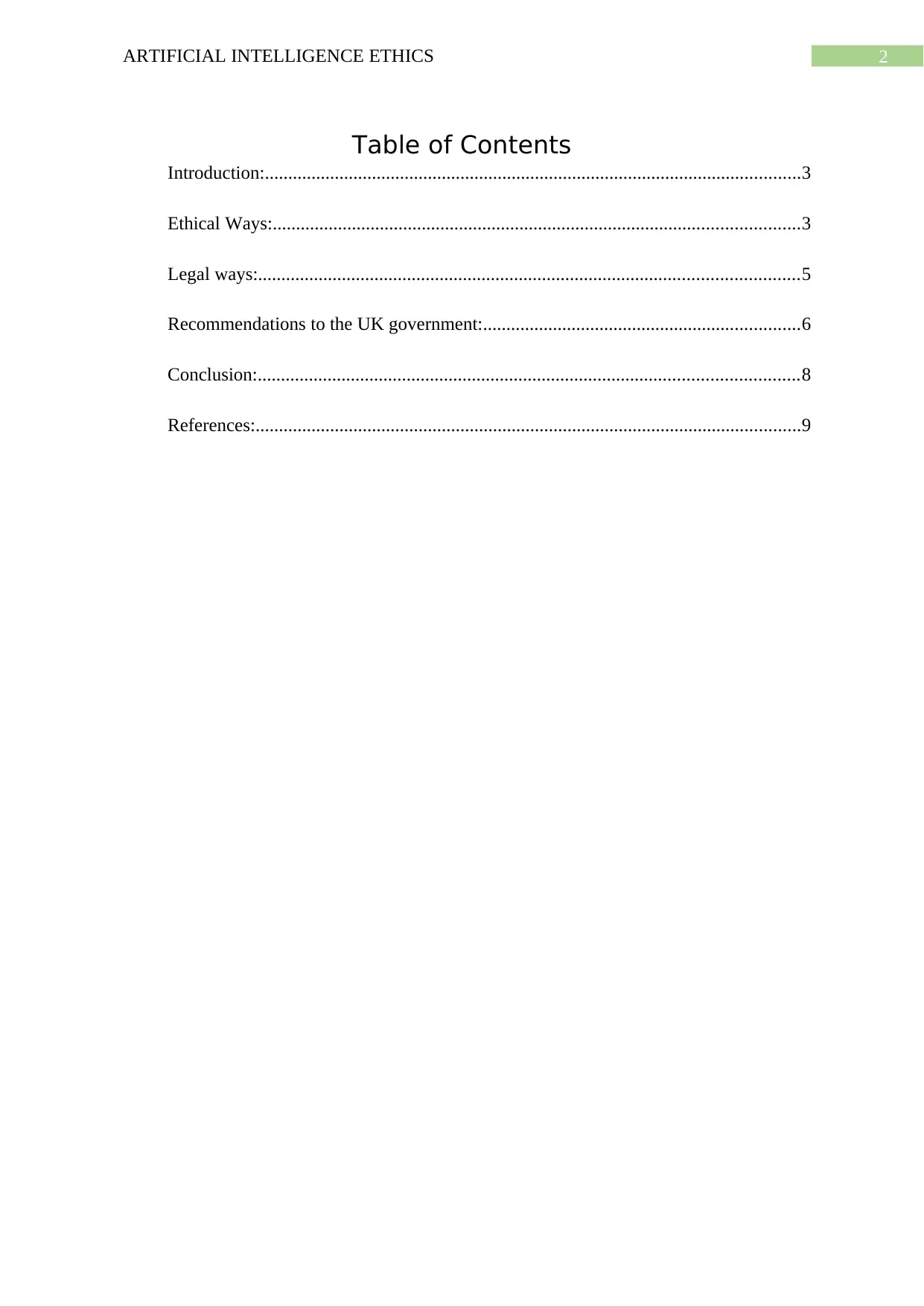
2ARTIFICIAL INTELLIGENCE ETHICS
Table of Contents
Introduction:...................................................................................................................3
Ethical Ways:.................................................................................................................3
Legal ways:....................................................................................................................5
Recommendations to the UK government:....................................................................6
Conclusion:....................................................................................................................8
References:.....................................................................................................................9
Table of Contents
Introduction:...................................................................................................................3
Ethical Ways:.................................................................................................................3
Legal ways:....................................................................................................................5
Recommendations to the UK government:....................................................................6
Conclusion:....................................................................................................................8
References:.....................................................................................................................9
⊘ This is a preview!⊘
Do you want full access?
Subscribe today to unlock all pages.

Trusted by 1+ million students worldwide
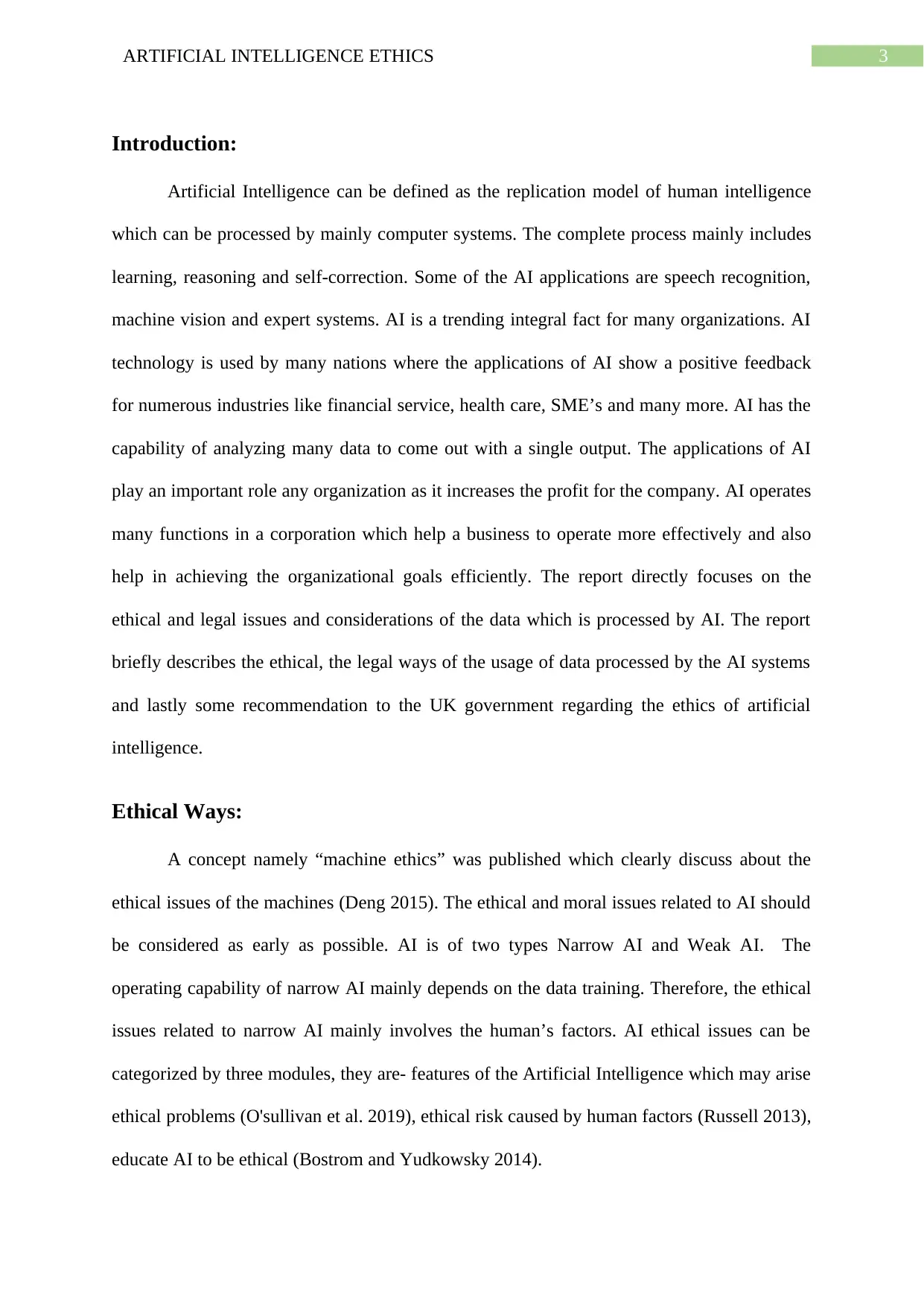
3ARTIFICIAL INTELLIGENCE ETHICS
Introduction:
Artificial Intelligence can be defined as the replication model of human intelligence
which can be processed by mainly computer systems. The complete process mainly includes
learning, reasoning and self-correction. Some of the AI applications are speech recognition,
machine vision and expert systems. AI is a trending integral fact for many organizations. AI
technology is used by many nations where the applications of AI show a positive feedback
for numerous industries like financial service, health care, SME’s and many more. AI has the
capability of analyzing many data to come out with a single output. The applications of AI
play an important role any organization as it increases the profit for the company. AI operates
many functions in a corporation which help a business to operate more effectively and also
help in achieving the organizational goals efficiently. The report directly focuses on the
ethical and legal issues and considerations of the data which is processed by AI. The report
briefly describes the ethical, the legal ways of the usage of data processed by the AI systems
and lastly some recommendation to the UK government regarding the ethics of artificial
intelligence.
Ethical Ways:
A concept namely “machine ethics” was published which clearly discuss about the
ethical issues of the machines (Deng 2015). The ethical and moral issues related to AI should
be considered as early as possible. AI is of two types Narrow AI and Weak AI. The
operating capability of narrow AI mainly depends on the data training. Therefore, the ethical
issues related to narrow AI mainly involves the human’s factors. AI ethical issues can be
categorized by three modules, they are- features of the Artificial Intelligence which may arise
ethical problems (O'sullivan et al. 2019), ethical risk caused by human factors (Russell 2013),
educate AI to be ethical (Bostrom and Yudkowsky 2014).
Introduction:
Artificial Intelligence can be defined as the replication model of human intelligence
which can be processed by mainly computer systems. The complete process mainly includes
learning, reasoning and self-correction. Some of the AI applications are speech recognition,
machine vision and expert systems. AI is a trending integral fact for many organizations. AI
technology is used by many nations where the applications of AI show a positive feedback
for numerous industries like financial service, health care, SME’s and many more. AI has the
capability of analyzing many data to come out with a single output. The applications of AI
play an important role any organization as it increases the profit for the company. AI operates
many functions in a corporation which help a business to operate more effectively and also
help in achieving the organizational goals efficiently. The report directly focuses on the
ethical and legal issues and considerations of the data which is processed by AI. The report
briefly describes the ethical, the legal ways of the usage of data processed by the AI systems
and lastly some recommendation to the UK government regarding the ethics of artificial
intelligence.
Ethical Ways:
A concept namely “machine ethics” was published which clearly discuss about the
ethical issues of the machines (Deng 2015). The ethical and moral issues related to AI should
be considered as early as possible. AI is of two types Narrow AI and Weak AI. The
operating capability of narrow AI mainly depends on the data training. Therefore, the ethical
issues related to narrow AI mainly involves the human’s factors. AI ethical issues can be
categorized by three modules, they are- features of the Artificial Intelligence which may arise
ethical problems (O'sullivan et al. 2019), ethical risk caused by human factors (Russell 2013),
educate AI to be ethical (Bostrom and Yudkowsky 2014).
Paraphrase This Document
Need a fresh take? Get an instant paraphrase of this document with our AI Paraphraser
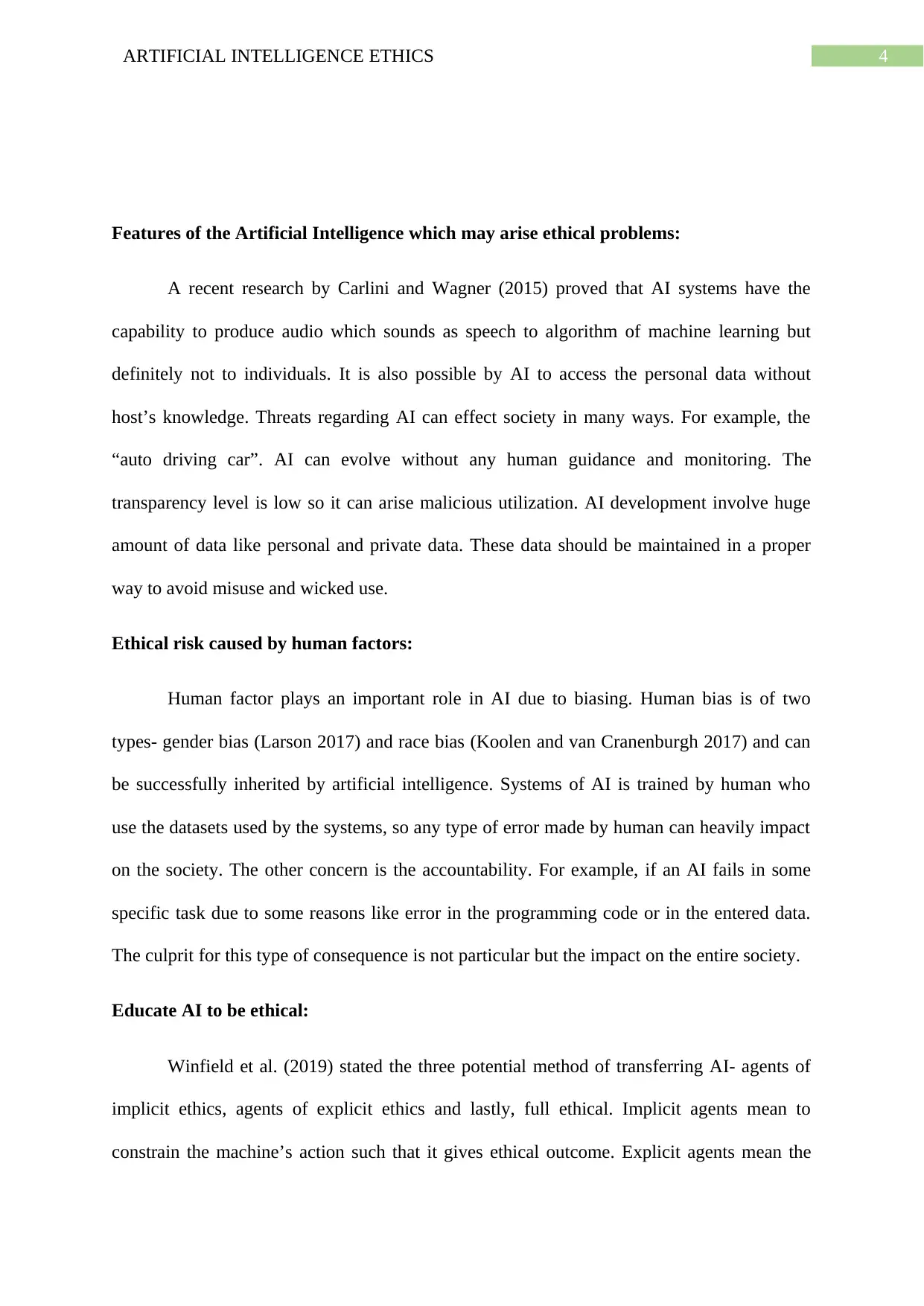
4ARTIFICIAL INTELLIGENCE ETHICS
Features of the Artificial Intelligence which may arise ethical problems:
A recent research by Carlini and Wagner (2015) proved that AI systems have the
capability to produce audio which sounds as speech to algorithm of machine learning but
definitely not to individuals. It is also possible by AI to access the personal data without
host’s knowledge. Threats regarding AI can effect society in many ways. For example, the
“auto driving car”. AI can evolve without any human guidance and monitoring. The
transparency level is low so it can arise malicious utilization. AI development involve huge
amount of data like personal and private data. These data should be maintained in a proper
way to avoid misuse and wicked use.
Ethical risk caused by human factors:
Human factor plays an important role in AI due to biasing. Human bias is of two
types- gender bias (Larson 2017) and race bias (Koolen and van Cranenburgh 2017) and can
be successfully inherited by artificial intelligence. Systems of AI is trained by human who
use the datasets used by the systems, so any type of error made by human can heavily impact
on the society. The other concern is the accountability. For example, if an AI fails in some
specific task due to some reasons like error in the programming code or in the entered data.
The culprit for this type of consequence is not particular but the impact on the entire society.
Educate AI to be ethical:
Winfield et al. (2019) stated the three potential method of transferring AI- agents of
implicit ethics, agents of explicit ethics and lastly, full ethical. Implicit agents mean to
constrain the machine’s action such that it gives ethical outcome. Explicit agents mean the
Features of the Artificial Intelligence which may arise ethical problems:
A recent research by Carlini and Wagner (2015) proved that AI systems have the
capability to produce audio which sounds as speech to algorithm of machine learning but
definitely not to individuals. It is also possible by AI to access the personal data without
host’s knowledge. Threats regarding AI can effect society in many ways. For example, the
“auto driving car”. AI can evolve without any human guidance and monitoring. The
transparency level is low so it can arise malicious utilization. AI development involve huge
amount of data like personal and private data. These data should be maintained in a proper
way to avoid misuse and wicked use.
Ethical risk caused by human factors:
Human factor plays an important role in AI due to biasing. Human bias is of two
types- gender bias (Larson 2017) and race bias (Koolen and van Cranenburgh 2017) and can
be successfully inherited by artificial intelligence. Systems of AI is trained by human who
use the datasets used by the systems, so any type of error made by human can heavily impact
on the society. The other concern is the accountability. For example, if an AI fails in some
specific task due to some reasons like error in the programming code or in the entered data.
The culprit for this type of consequence is not particular but the impact on the entire society.
Educate AI to be ethical:
Winfield et al. (2019) stated the three potential method of transferring AI- agents of
implicit ethics, agents of explicit ethics and lastly, full ethical. Implicit agents mean to
constrain the machine’s action such that it gives ethical outcome. Explicit agents mean the
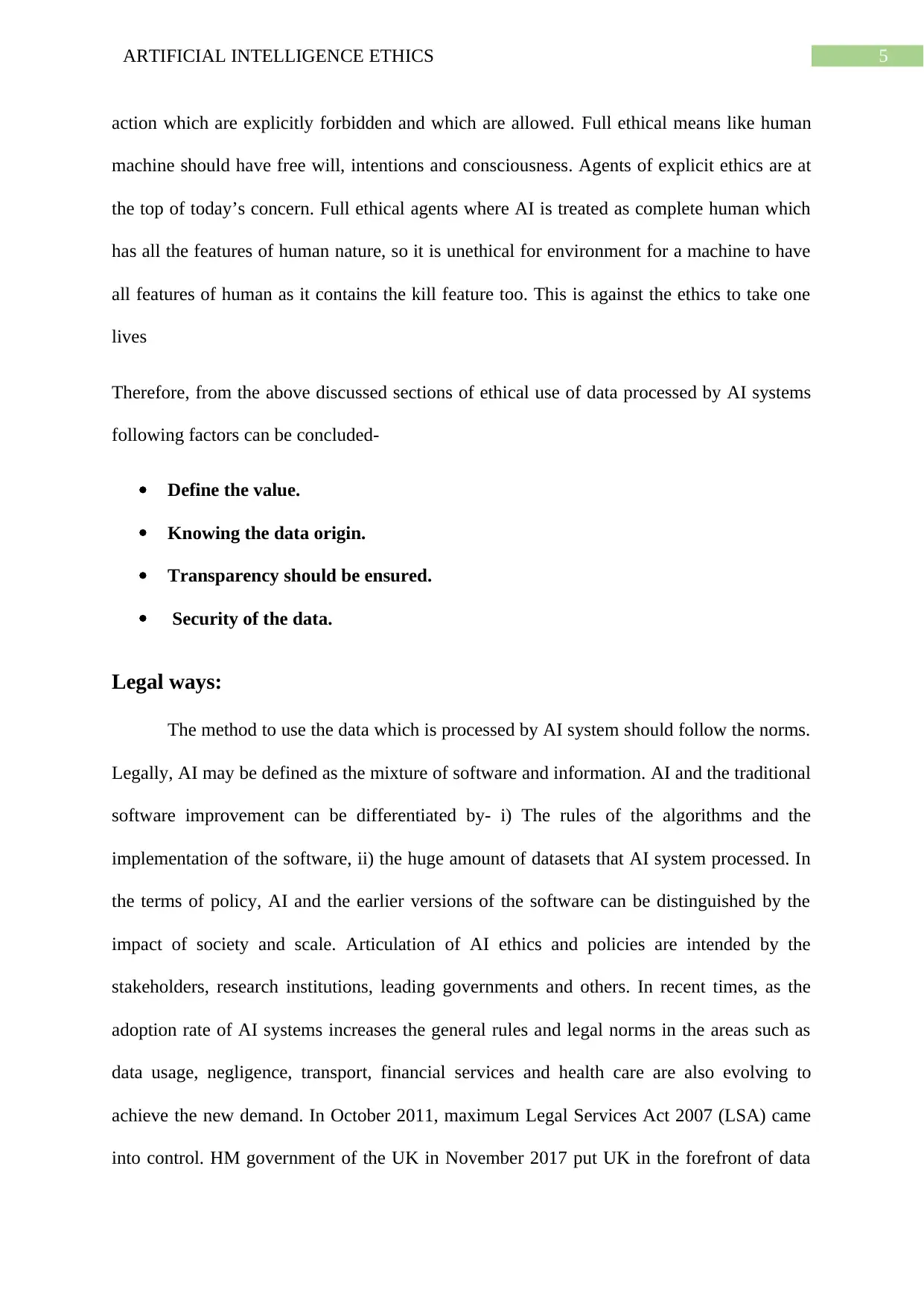
5ARTIFICIAL INTELLIGENCE ETHICS
action which are explicitly forbidden and which are allowed. Full ethical means like human
machine should have free will, intentions and consciousness. Agents of explicit ethics are at
the top of today’s concern. Full ethical agents where AI is treated as complete human which
has all the features of human nature, so it is unethical for environment for a machine to have
all features of human as it contains the kill feature too. This is against the ethics to take one
lives
Therefore, from the above discussed sections of ethical use of data processed by AI systems
following factors can be concluded-
Define the value.
Knowing the data origin.
Transparency should be ensured.
Security of the data.
Legal ways:
The method to use the data which is processed by AI system should follow the norms.
Legally, AI may be defined as the mixture of software and information. AI and the traditional
software improvement can be differentiated by- i) The rules of the algorithms and the
implementation of the software, ii) the huge amount of datasets that AI system processed. In
the terms of policy, AI and the earlier versions of the software can be distinguished by the
impact of society and scale. Articulation of AI ethics and policies are intended by the
stakeholders, research institutions, leading governments and others. In recent times, as the
adoption rate of AI systems increases the general rules and legal norms in the areas such as
data usage, negligence, transport, financial services and health care are also evolving to
achieve the new demand. In October 2011, maximum Legal Services Act 2007 (LSA) came
into control. HM government of the UK in November 2017 put UK in the forefront of data
action which are explicitly forbidden and which are allowed. Full ethical means like human
machine should have free will, intentions and consciousness. Agents of explicit ethics are at
the top of today’s concern. Full ethical agents where AI is treated as complete human which
has all the features of human nature, so it is unethical for environment for a machine to have
all features of human as it contains the kill feature too. This is against the ethics to take one
lives
Therefore, from the above discussed sections of ethical use of data processed by AI systems
following factors can be concluded-
Define the value.
Knowing the data origin.
Transparency should be ensured.
Security of the data.
Legal ways:
The method to use the data which is processed by AI system should follow the norms.
Legally, AI may be defined as the mixture of software and information. AI and the traditional
software improvement can be differentiated by- i) The rules of the algorithms and the
implementation of the software, ii) the huge amount of datasets that AI system processed. In
the terms of policy, AI and the earlier versions of the software can be distinguished by the
impact of society and scale. Articulation of AI ethics and policies are intended by the
stakeholders, research institutions, leading governments and others. In recent times, as the
adoption rate of AI systems increases the general rules and legal norms in the areas such as
data usage, negligence, transport, financial services and health care are also evolving to
achieve the new demand. In October 2011, maximum Legal Services Act 2007 (LSA) came
into control. HM government of the UK in November 2017 put UK in the forefront of data
⊘ This is a preview!⊘
Do you want full access?
Subscribe today to unlock all pages.

Trusted by 1+ million students worldwide
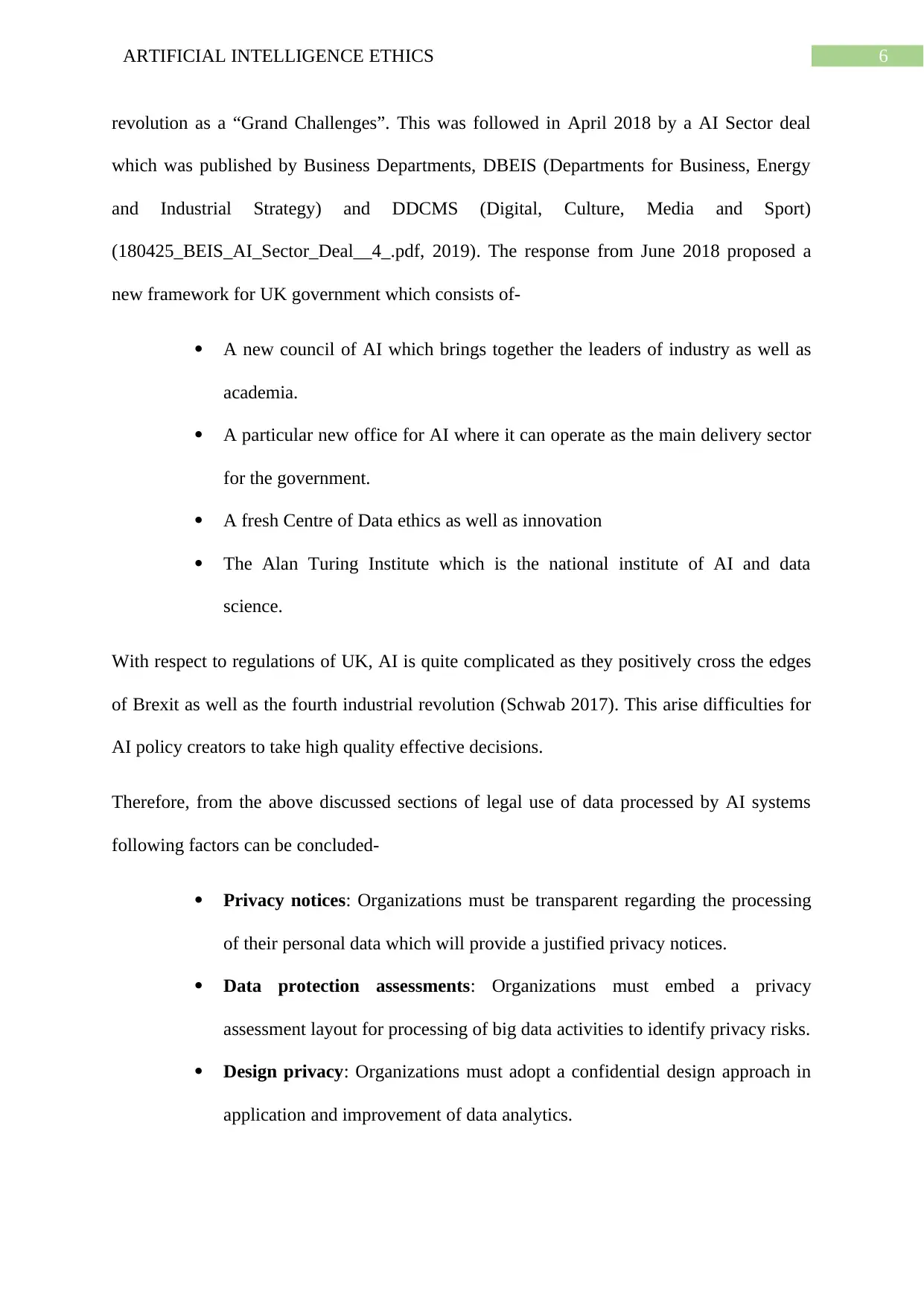
6ARTIFICIAL INTELLIGENCE ETHICS
revolution as a “Grand Challenges”. This was followed in April 2018 by a AI Sector deal
which was published by Business Departments, DBEIS (Departments for Business, Energy
and Industrial Strategy) and DDCMS (Digital, Culture, Media and Sport)
(180425_BEIS_AI_Sector_Deal__4_.pdf, 2019). The response from June 2018 proposed a
new framework for UK government which consists of-
A new council of AI which brings together the leaders of industry as well as
academia.
A particular new office for AI where it can operate as the main delivery sector
for the government.
A fresh Centre of Data ethics as well as innovation
The Alan Turing Institute which is the national institute of AI and data
science.
With respect to regulations of UK, AI is quite complicated as they positively cross the edges
of Brexit as well as the fourth industrial revolution (Schwab 2017). This arise difficulties for
AI policy creators to take high quality effective decisions.
Therefore, from the above discussed sections of legal use of data processed by AI systems
following factors can be concluded-
Privacy notices: Organizations must be transparent regarding the processing
of their personal data which will provide a justified privacy notices.
Data protection assessments: Organizations must embed a privacy
assessment layout for processing of big data activities to identify privacy risks.
Design privacy: Organizations must adopt a confidential design approach in
application and improvement of data analytics.
revolution as a “Grand Challenges”. This was followed in April 2018 by a AI Sector deal
which was published by Business Departments, DBEIS (Departments for Business, Energy
and Industrial Strategy) and DDCMS (Digital, Culture, Media and Sport)
(180425_BEIS_AI_Sector_Deal__4_.pdf, 2019). The response from June 2018 proposed a
new framework for UK government which consists of-
A new council of AI which brings together the leaders of industry as well as
academia.
A particular new office for AI where it can operate as the main delivery sector
for the government.
A fresh Centre of Data ethics as well as innovation
The Alan Turing Institute which is the national institute of AI and data
science.
With respect to regulations of UK, AI is quite complicated as they positively cross the edges
of Brexit as well as the fourth industrial revolution (Schwab 2017). This arise difficulties for
AI policy creators to take high quality effective decisions.
Therefore, from the above discussed sections of legal use of data processed by AI systems
following factors can be concluded-
Privacy notices: Organizations must be transparent regarding the processing
of their personal data which will provide a justified privacy notices.
Data protection assessments: Organizations must embed a privacy
assessment layout for processing of big data activities to identify privacy risks.
Design privacy: Organizations must adopt a confidential design approach in
application and improvement of data analytics.
Paraphrase This Document
Need a fresh take? Get an instant paraphrase of this document with our AI Paraphraser
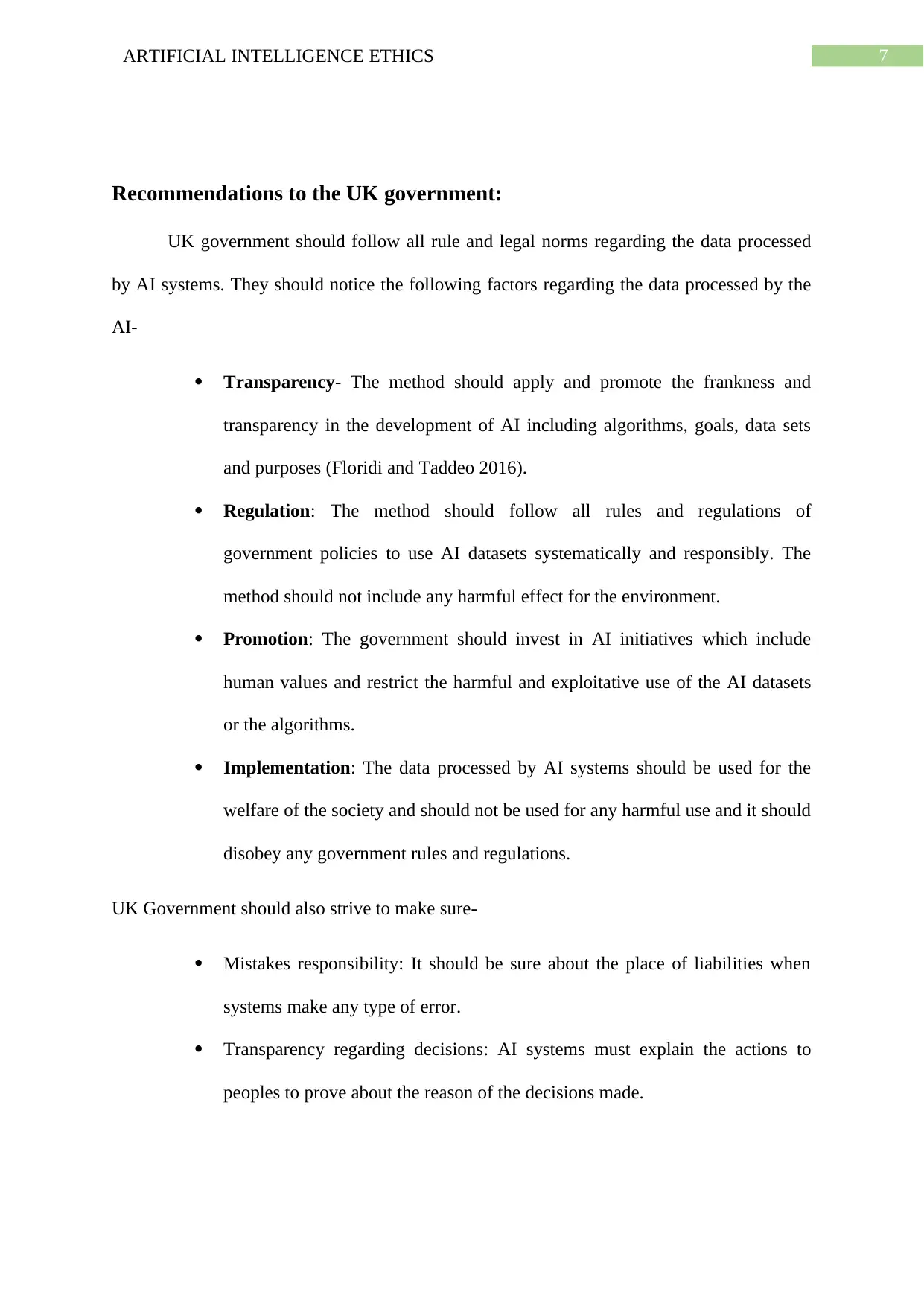
7ARTIFICIAL INTELLIGENCE ETHICS
Recommendations to the UK government:
UK government should follow all rule and legal norms regarding the data processed
by AI systems. They should notice the following factors regarding the data processed by the
AI-
Transparency- The method should apply and promote the frankness and
transparency in the development of AI including algorithms, goals, data sets
and purposes (Floridi and Taddeo 2016).
Regulation: The method should follow all rules and regulations of
government policies to use AI datasets systematically and responsibly. The
method should not include any harmful effect for the environment.
Promotion: The government should invest in AI initiatives which include
human values and restrict the harmful and exploitative use of the AI datasets
or the algorithms.
Implementation: The data processed by AI systems should be used for the
welfare of the society and should not be used for any harmful use and it should
disobey any government rules and regulations.
UK Government should also strive to make sure-
Mistakes responsibility: It should be sure about the place of liabilities when
systems make any type of error.
Transparency regarding decisions: AI systems must explain the actions to
peoples to prove about the reason of the decisions made.
Recommendations to the UK government:
UK government should follow all rule and legal norms regarding the data processed
by AI systems. They should notice the following factors regarding the data processed by the
AI-
Transparency- The method should apply and promote the frankness and
transparency in the development of AI including algorithms, goals, data sets
and purposes (Floridi and Taddeo 2016).
Regulation: The method should follow all rules and regulations of
government policies to use AI datasets systematically and responsibly. The
method should not include any harmful effect for the environment.
Promotion: The government should invest in AI initiatives which include
human values and restrict the harmful and exploitative use of the AI datasets
or the algorithms.
Implementation: The data processed by AI systems should be used for the
welfare of the society and should not be used for any harmful use and it should
disobey any government rules and regulations.
UK Government should also strive to make sure-
Mistakes responsibility: It should be sure about the place of liabilities when
systems make any type of error.
Transparency regarding decisions: AI systems must explain the actions to
peoples to prove about the reason of the decisions made.
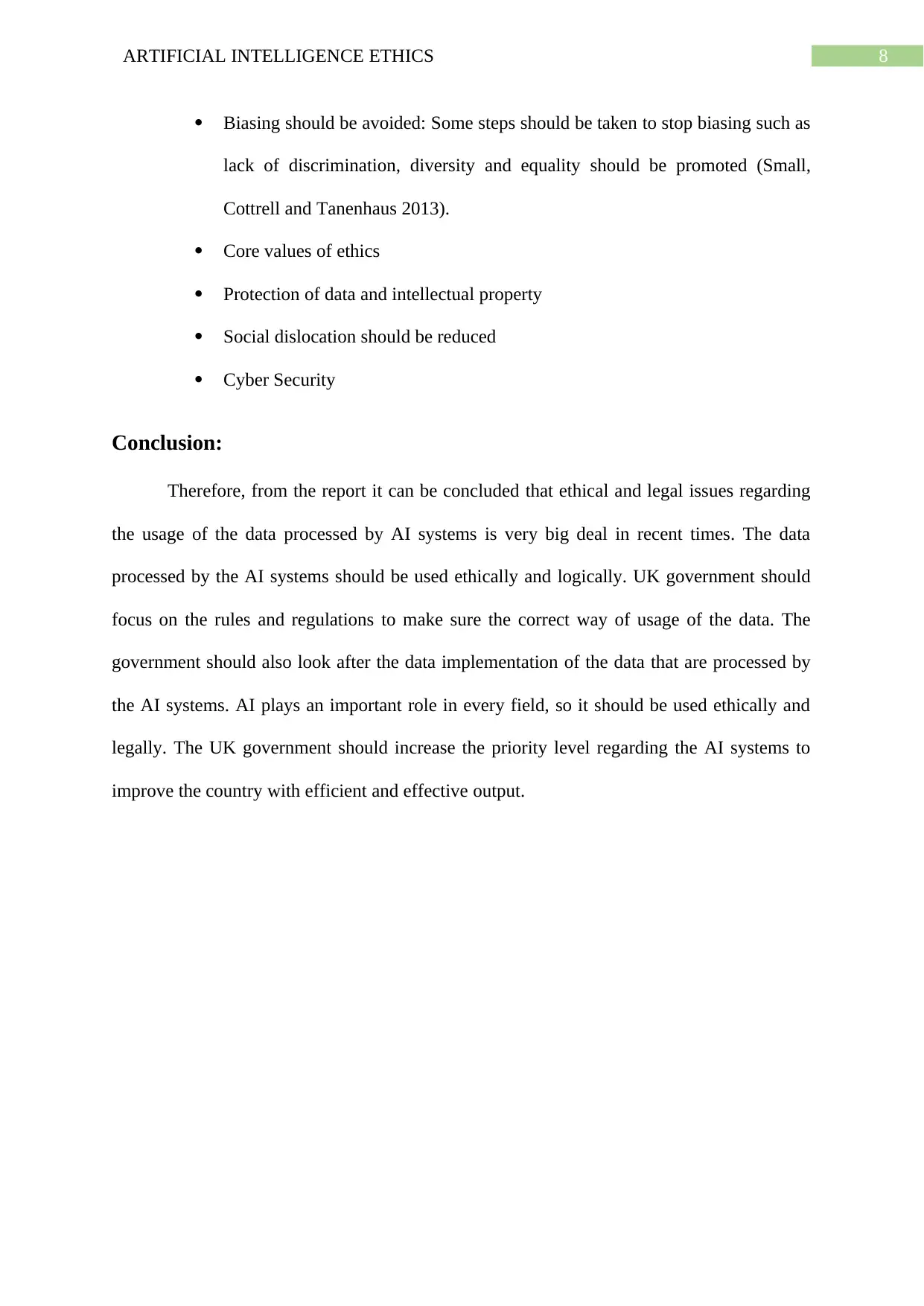
8ARTIFICIAL INTELLIGENCE ETHICS
Biasing should be avoided: Some steps should be taken to stop biasing such as
lack of discrimination, diversity and equality should be promoted (Small,
Cottrell and Tanenhaus 2013).
Core values of ethics
Protection of data and intellectual property
Social dislocation should be reduced
Cyber Security
Conclusion:
Therefore, from the report it can be concluded that ethical and legal issues regarding
the usage of the data processed by AI systems is very big deal in recent times. The data
processed by the AI systems should be used ethically and logically. UK government should
focus on the rules and regulations to make sure the correct way of usage of the data. The
government should also look after the data implementation of the data that are processed by
the AI systems. AI plays an important role in every field, so it should be used ethically and
legally. The UK government should increase the priority level regarding the AI systems to
improve the country with efficient and effective output.
Biasing should be avoided: Some steps should be taken to stop biasing such as
lack of discrimination, diversity and equality should be promoted (Small,
Cottrell and Tanenhaus 2013).
Core values of ethics
Protection of data and intellectual property
Social dislocation should be reduced
Cyber Security
Conclusion:
Therefore, from the report it can be concluded that ethical and legal issues regarding
the usage of the data processed by AI systems is very big deal in recent times. The data
processed by the AI systems should be used ethically and logically. UK government should
focus on the rules and regulations to make sure the correct way of usage of the data. The
government should also look after the data implementation of the data that are processed by
the AI systems. AI plays an important role in every field, so it should be used ethically and
legally. The UK government should increase the priority level regarding the AI systems to
improve the country with efficient and effective output.
⊘ This is a preview!⊘
Do you want full access?
Subscribe today to unlock all pages.

Trusted by 1+ million students worldwide
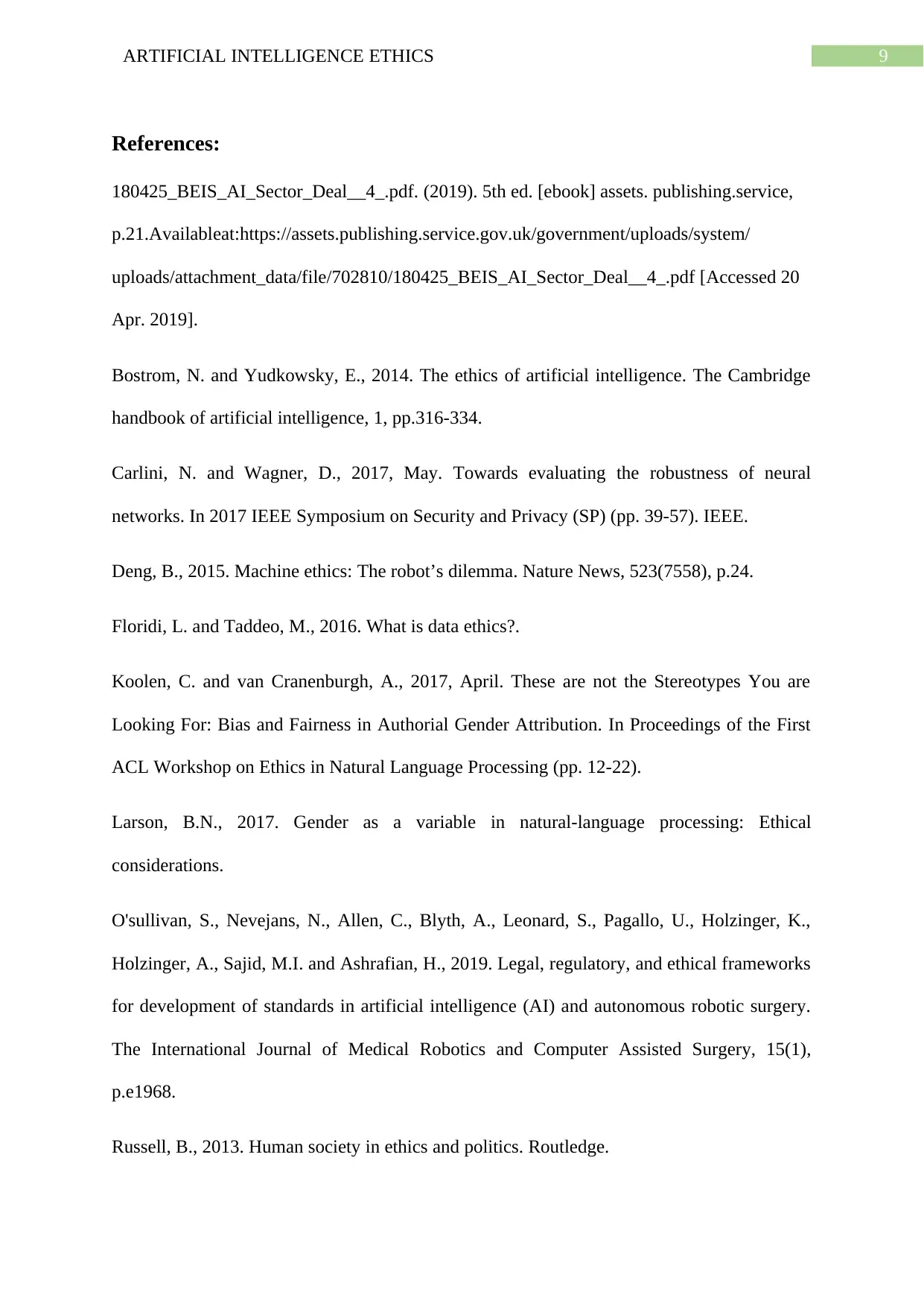
9ARTIFICIAL INTELLIGENCE ETHICS
References:
180425_BEIS_AI_Sector_Deal__4_.pdf. (2019). 5th ed. [ebook] assets. publishing.service,
p.21.Availableat:https://assets.publishing.service.gov.uk/government/uploads/system/
uploads/attachment_data/file/702810/180425_BEIS_AI_Sector_Deal__4_.pdf [Accessed 20
Apr. 2019].
Bostrom, N. and Yudkowsky, E., 2014. The ethics of artificial intelligence. The Cambridge
handbook of artificial intelligence, 1, pp.316-334.
Carlini, N. and Wagner, D., 2017, May. Towards evaluating the robustness of neural
networks. In 2017 IEEE Symposium on Security and Privacy (SP) (pp. 39-57). IEEE.
Deng, B., 2015. Machine ethics: The robot’s dilemma. Nature News, 523(7558), p.24.
Floridi, L. and Taddeo, M., 2016. What is data ethics?.
Koolen, C. and van Cranenburgh, A., 2017, April. These are not the Stereotypes You are
Looking For: Bias and Fairness in Authorial Gender Attribution. In Proceedings of the First
ACL Workshop on Ethics in Natural Language Processing (pp. 12-22).
Larson, B.N., 2017. Gender as a variable in natural-language processing: Ethical
considerations.
O'sullivan, S., Nevejans, N., Allen, C., Blyth, A., Leonard, S., Pagallo, U., Holzinger, K.,
Holzinger, A., Sajid, M.I. and Ashrafian, H., 2019. Legal, regulatory, and ethical frameworks
for development of standards in artificial intelligence (AI) and autonomous robotic surgery.
The International Journal of Medical Robotics and Computer Assisted Surgery, 15(1),
p.e1968.
Russell, B., 2013. Human society in ethics and politics. Routledge.
References:
180425_BEIS_AI_Sector_Deal__4_.pdf. (2019). 5th ed. [ebook] assets. publishing.service,
p.21.Availableat:https://assets.publishing.service.gov.uk/government/uploads/system/
uploads/attachment_data/file/702810/180425_BEIS_AI_Sector_Deal__4_.pdf [Accessed 20
Apr. 2019].
Bostrom, N. and Yudkowsky, E., 2014. The ethics of artificial intelligence. The Cambridge
handbook of artificial intelligence, 1, pp.316-334.
Carlini, N. and Wagner, D., 2017, May. Towards evaluating the robustness of neural
networks. In 2017 IEEE Symposium on Security and Privacy (SP) (pp. 39-57). IEEE.
Deng, B., 2015. Machine ethics: The robot’s dilemma. Nature News, 523(7558), p.24.
Floridi, L. and Taddeo, M., 2016. What is data ethics?.
Koolen, C. and van Cranenburgh, A., 2017, April. These are not the Stereotypes You are
Looking For: Bias and Fairness in Authorial Gender Attribution. In Proceedings of the First
ACL Workshop on Ethics in Natural Language Processing (pp. 12-22).
Larson, B.N., 2017. Gender as a variable in natural-language processing: Ethical
considerations.
O'sullivan, S., Nevejans, N., Allen, C., Blyth, A., Leonard, S., Pagallo, U., Holzinger, K.,
Holzinger, A., Sajid, M.I. and Ashrafian, H., 2019. Legal, regulatory, and ethical frameworks
for development of standards in artificial intelligence (AI) and autonomous robotic surgery.
The International Journal of Medical Robotics and Computer Assisted Surgery, 15(1),
p.e1968.
Russell, B., 2013. Human society in ethics and politics. Routledge.
Paraphrase This Document
Need a fresh take? Get an instant paraphrase of this document with our AI Paraphraser

10ARTIFICIAL INTELLIGENCE ETHICS
Schwab, K., 2017. The fourth industrial revolution. Currency.
Small, S.L., Cottrell, G.W. and Tanenhaus, M.K. eds., 2013. Lexical Ambiguity Resolution:
Perspective from Psycholinguistics, Neuropsychology and Artificial Intelligence. Elsevier.
Winfield, A.F., Michael, K., Pitt, J. and Evers, V., 2019. Machine Ethics: The Design and
Governance of Ethical AI and Autonomous Systems. Proceedings of the IEEE, 107(3),
pp.509-517.
Schwab, K., 2017. The fourth industrial revolution. Currency.
Small, S.L., Cottrell, G.W. and Tanenhaus, M.K. eds., 2013. Lexical Ambiguity Resolution:
Perspective from Psycholinguistics, Neuropsychology and Artificial Intelligence. Elsevier.
Winfield, A.F., Michael, K., Pitt, J. and Evers, V., 2019. Machine Ethics: The Design and
Governance of Ethical AI and Autonomous Systems. Proceedings of the IEEE, 107(3),
pp.509-517.
1 out of 11
Related Documents
Your All-in-One AI-Powered Toolkit for Academic Success.
+13062052269
info@desklib.com
Available 24*7 on WhatsApp / Email
![[object Object]](/_next/static/media/star-bottom.7253800d.svg)
Unlock your academic potential
Copyright © 2020–2026 A2Z Services. All Rights Reserved. Developed and managed by ZUCOL.





